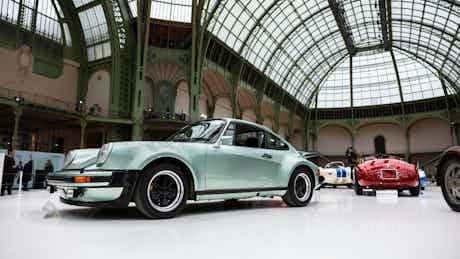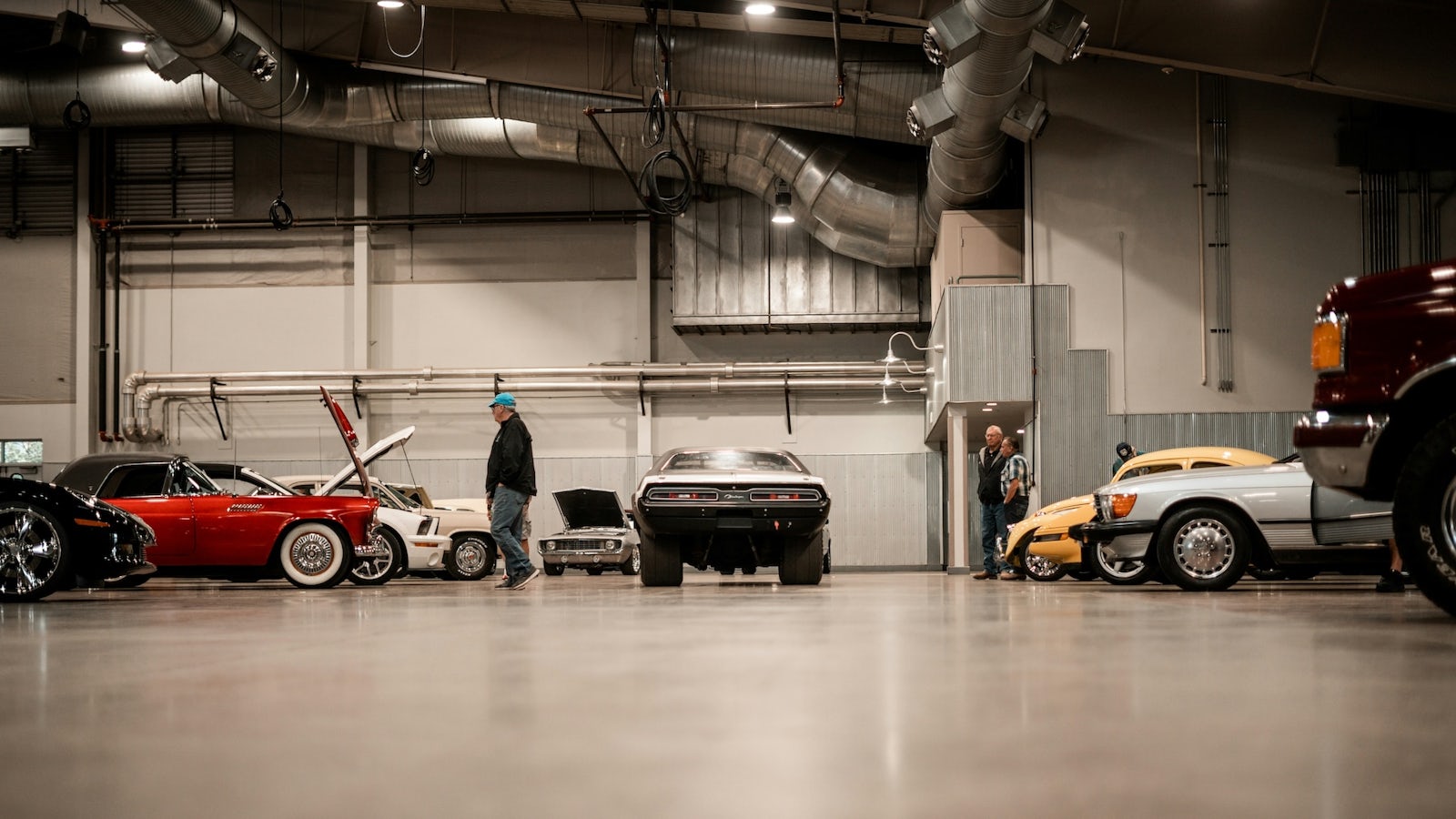How do I buy a car at auction?
July 24, 2025 by Siobhan Doyle

Buying a car at auction might seem intimidating at first, but it can be a smart way to land a quality car at a bargain price. Here’s everything you need to know.
Thousands of cars are sold at auction every week in the UK, with a small percentage going to private buyers. This guide will walk you through everything you need to know, and what to watch out for, when buying a car at auction.
Did you know you can buy a used car right here on Carwow? And you can sell your car, too. We’re here to help you through every step of your car-changing journey.
How to buy cars at auction
Buying a car at auction can be exciting, but it’s best to be prepared. Arrive early to inspect any cars you’re interested in. While test drives typically aren’t allowed, most auction houses will let you start the engine. In this case, listen for odd noises, look for smoke, and check for visible damage or leaks. Our used car checklist can help.
Cars are listed as numbered ‘lots’ and drive through in order. The auctioneer starts the bidding, and the car goes to the highest bidder.
If you’re the winning bidder, you’ll need to pay a deposit: usually £500 or 10% of the sale price, whichever is greater. You’ll then settle the remaining balance at the cash office. Be sure to check accepted payment methods in advance, as they can vary by auction house.
It’s your responsibility to make sure that the car is taxed, has a valid MOT, and is insured before you drive it home.
How do I place a bid?
At a physical auction, the auctioneer will usually announce key details such as the car’s service history, MOT status, and mileage, so it’s important to pay close attention.
Stand where the auctioneer can clearly see you, and make your bids obvious. Subtle nods or hand gestures might look slick in films, but they can easily be missed in a busy auction room, meaning your bid may not be counted.
Once your bid is acknowledged, listen out for competing offers. If you’re still interested, raise your hand or signal again to continue bidding. Once bidding surpasses the reserve price (the minimum the seller will accept), the car will sell to the highest bidder.
Online auctions are now just as common, with platforms such as BCA and Manheim offering live bidding through their websites. You can view detailed listings, place bids in real time, and even set maximum bids, all from home. Just make sure you understand the terms and fees before bidding.
Pros and cons of buying a car at auction
Pros of buying a car at auction
Buying a car at auction offers several advantages, making it an appealing option for many buyers:
- Potential for great deals below market value.
- Wide variety of vehicles, from nearly new to classic and salvage cars.
- Transparent bidding process lets you see real-time offers.
- The buying and paperwork usually happens quickly, on the same day.
- Access to trade-only vehicles usually unavailable to private buyers.
Cons of buying a car at auction
However, there are some drawbacks to be aware of before you bid:
- Limited opportunity to thoroughly inspect or test drive the car.
- Cars sold ‘as-is’ with no warranty, so faults are your responsibility.
- Competitive bidding can drive prices higher than expected.
- Additional fees and immediate payment requirements can increase costs.
- You need great knowledge and preparation to avoid overpaying or buying problematic cars.
Is buying a car at auction worth it?
Yes, it can be… if you know what you’re doing.
Buying a used car at auction can save you money and give you access to a wide range of cars, but it’s not without risks. You usually can’t test drive the car, and all sales are final, so it’s important to do your research and set a firm budget.
It’s worth it if:
- You’re confident inspecting cars (or you’re with someone who is).
- You’ve researched the auction process and fees.
- You’re prepared to quickly buy a car without warranties.
It might not be worth it if:
- You’re new to buying cars and unsure what to look for.
- You want peace of mind with a warranty or return option.
- You’re uncomfortable with fast-paced bidding.

Where to find upcoming auctions
Car auctions are held all over the UK, and finding one near you is as simple as doing a quick online search.
Many auction houses now offer live online bidding, so you can take part without visiting in person. There are also online-only platforms such as eBay Motors or BCA Online, which let you bid from home.
While online bidding is convenient, keep in mind that you’ll often need to collect the car yourself. Some auction houses offer delivery, but this usually comes at an extra cost, and can be expensive depending on the distance.
Top tips for buying a car at auction
If it’s your first time at a car auction, there are a few ways to make the experience smoother and less stressful. Here are our top five tips:
1. Attend a few auctions just to observe
Go to one or two auctions without bidding. This gives you a feel for how the process works, from how bids are made to how quickly sales happen, so you’ll be more confident when it’s time to buy.
2. Do your research in advance
Know the car you’re interested in. Look up typical prices, specs, and common issues. In fact, Carwow can help you check current market values through our online valuation tool.
3. Arrive early and inspect the cars
Getting there ahead of time lets you look over any cars you’re considering. While test drives aren’t allowed, most auction houses will let you start the engine. If you’re not confident checking the car yourself, bring someone who knows what to look (and listen) for.
4. Set a strict budget and stick to it
It’s easy to get caught up in the heat of bidding. Decide your maximum price beforehand – including fees – and don’t go over it, no matter what.
5. Avoid standing out as a private buyer
Don’t bring your catalogue into the auction room. Private buyers and traders sometimes receive different versions. If traders spot you as a private buyer, they may try to ‘bid you up’, pushing the price higher before dropping out. Blending in helps you avoid becoming a target.
Buying cars at auction FAQs
Can anyone buy a car at auction?
Yes, as long as the auction is open to the public. Some auctions are trade-only, meaning only licenced motor traders can bid. But many public auctions allow private buyers to register with photo ID and start bidding.
If it’s your first time, it’s a good idea to attend a few auctions just to observe. This helps you get familiar with how bidding works and how experienced buyers behave, so you’ll feel more confident when you’re ready to take part.
Will I incur any fees at auction?
Yes, in most cases you’ll need to pay a buyer’s fee on top of the sale price of the car. This fee varies by auction house and is usually a fixed amount or a percentage of the sale price, often on a sliding scale.
For example, you might pay £100 on a cheap runaround or 5-6% on a more expensive car.
Some fees may also be subject to VAT, so be sure to check the auction house’s fee structure before bidding – it can make a big difference to your total cost.
Can I attend a car auction online?
Yes, you can go to car auctions online. Most auction houses now have websites where you can view cars, join live auctions, and place bids, all from the comfort of your home. You simply just need an internet connection.
Is buying a car at auction cheaper?
Yes, used cars at auction are usually cheaper than buying from a dealer or private seller. That’s because many dealers buy cars at auction, then resell them at a higher price to make profit. However, lower prices aren’t always guaranteed. Auctions come with extra fees, and since you often can’t do a full inspection or test drive, there’s a bit more risk involved.
Car change? Carwow!
Looking for a new set of wheels? With Carwow you can sell your car quickly and for a fair price – as well as find great offers on your next one. Whether you’re looking to buy a car brand new, are after something used or you want to explore car leasing options, Carwow is your one stop shop for new car deals.
Click here to follow us on WhatsApp, where you can keep up-to-date with all the latest news, reviews, advice guides and videos.















